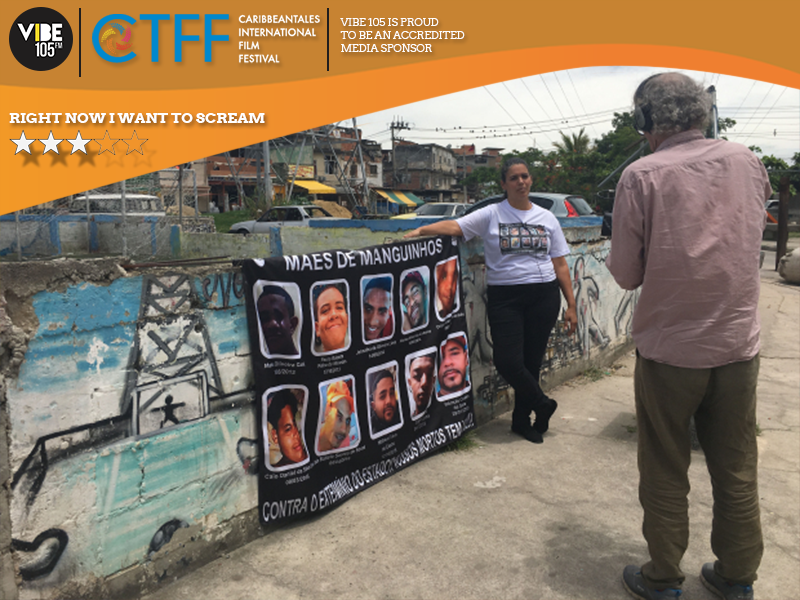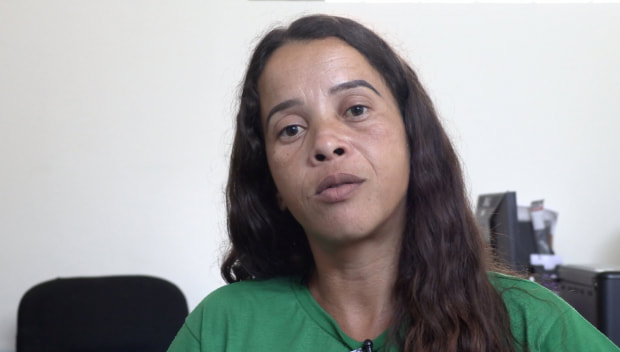|
The Shades of Tolerance programme of the 16th annual CaribbeanTales Film Festival introduced yet another moving film surrounding great love and great losses: Right Now I Want to Scream: Police and Army Killings in Rio – The Brazil Haiti Connection. This film recounts, stories from the family of those murdered at the hands of police.. Trauma and anguish have many layers - and this film is designed to dive deeper into them. The story kicks off with a beautiful montage of Brazil’s landscape. Various compositions of movement - including dancing, sports, recreation, and pedestrians walking, illustrate the effervescence of the streets of Rio. Life and mortality are shown to be great themes within this film, especially when contrasting with the harrowing message projected throughout. The decision to have both contrasting clips follow one another is rather intentional; vivacity and livelihood for the victims of police brutality were torn away from them, and this story effectively conveys this. The choice of setting for this film is rather crucial – with an increased general knowledge of police brutality in North America, it is imperative that viewers also divest their attention to the cries of those affected by a brutal police force in other marginalized communities (with a notable large, Black presence). This film touches on the dangers of over-policing, and the implications imposed on communities that are deemed “worth punishing”. Ambiguous notions of good vs. evil is what has allowed for the validation and continued presence of police force - this film challenges that. “Ambiguous notions of good vs. evil is what has allowed for the validation and continued presence of police force - this film challenges that.” Directors Cahal McLaughlin and Siobhán Wills have sturdy ties to this story, as this film builds upon a previous film, they both directed - It Stays with You: Use of Force by UN Peacekeepers in Haiti (2018). Mentions of the United Nations Mission for Justice Support in Haiti (MINUSTAH) are credited in both films, reinstating the shared themes of life and mortality. The raw emotion seen from the subjects, while gut-wrenching, speaks to the humanity of the viewer and keeps them engaged. Watching the subjects speak felt tugged at the empath within me – I saw my own mother and father on the screen. The love and care shown by the parents of the deceased left me in a fearful state, knowing how much injustice can tear families apart, and I was left wondering if I would even have the strength to express my trauma to a camera. This film effectively instills the fear in all of us with loved ones – how much longer until it is our story that is told? In contrast, in terms of formalities, this film does not quite meet the bar. Sound proved to be a great distraction while watching, leaving me wondering if the sound mixing was disregarded or considered as an afterthought. The soundscape starts strong, with the sound of the natural environment of Rio, along with the active streets allows the viewer to feel immersed. However, at some point in the film, we no longer hear much of this soundscape. The decision to only include music at the beginning and end of the film was deliberate but could have aided in moving the story along, as the lack of sound composition to support the story leaves the film feeling rather empty. As for the picture edit itself, the stories of the interviewees feel slightly out of sync. The film feels almost as if one is reading an anthology, with no clear direction of the placements of clips. There are quite a few subjects that were interviewed, but there is no sense of connection or flow with one another. Additionally, at some points, the b-roll had no clear connection to what was stated. Overall, it felt almost as if a lot of information was being hurled at the viewer, with no intention of fluidity and consistency. “The film feels almost as if I were reading an anthology, with no clear direction of the placements of footage." The cinematography feels rather dry. While this contributes to the grim concept of the film, this choice of lighting and colouring does not allow the film subjects to stand apart from their surroundings. In terms of content, there was a particular concern with the lack of infusion of Brazil’s connection to Haiti; their connection is pretty brief, and I believe that allowing more of a blend of both stories would allow for more dynamic compositions of the film. In sum, Right Now I Want to Scream is a film that effectively evokes themes of despair, life, loss, and mortality. This story proves that activism extends beyond the world that we know and are familiar with – Black people in other regions are also suffering from injustice and are chronically victim to the hands of police brutality. While the substandard technical elements heave potential to reduce the film, the content and message remain crystal clear: the revolution is alive everywhere. Editor’s Note: Right Now I Want to Scream: Police and Army Killings in Rio – The Brazil Haiti Connection screened at the Caribbean Tales Film Festival ’21, as part of the Shades of Intolerance programme.
|
Recent Posts
Categories
All
Archives
February 2022
|
|
GET THE APP!
Listen to VIBE 105 anywhere you go!
|
OUR STATION
|
TUNE IN RADIO
|
STAY CONNECTED
|
Copyright © 2021 Canadian Centre for Civic Media and Arts Development Inc. Except where otherwise noted, presentation of content on this site is protected by copyright law and redistribution without consent or written permission of the sponsor is strictly prohibited.




 RSS Feed
RSS Feed


